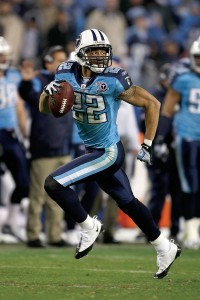Vincent Fuller ’17 has traded his football pads for legal pads.
As an NFL defensive back, Vincent Fuller II studied opposing quarterbacks like division rival Peyton Manning to best understand and react to what they might do on any given down and distance. These days, the Fordham Law School student views professors’ presentations on case law and studies them, as he would game film, in order to grasp the legal issues before him.
“All quarterbacks have something they’re trying to accomplish on a particular play. There’s a systematic process there where, if you take and apply it to the legal field, you can find parallels and have success,” Fuller, 33, says, citing the importance of professors, like coaches, in understanding the bigger picture.
Fuller’s path from the NFL to law school is a rare one but not without precedent. Recently retired NFL players including cornerback Chris Carr and tight end Colin Cloherty are currently studying for their J.D.s at George Washington University and the University of Maryland, respectively. NFL greats Alan Page and Steve Young also earned law degrees.
Fuller’s decision to attend law school occurred as one door momentarily closed.
The 2011 NFL lockout, he recalls, opened his eyes to the need “to advocate for myself” in such situations. “Not having a voice” during the four-month standoff between attorneys from the league and NFL Players Association motivated him to pursue the law as a second career, he says.
At season’s end, Fuller retired from the NFL as a seven-year veteran. He had played six seasons as a cornerback and safety for the Tennessee Titans, the franchise that drafted him in the fourth round in 2005 out of Virginia Tech. His career highlights include 76 games played, 162 tackles, and six interceptions, four of which he returned for touchdowns.

Fuller’s lockout epiphany might suggest sports law is in his future, but he stresses he intends to use Fordham to “broaden his spectrum” rather than “pigeonhole” himself. For instance, he is taking intellectual property and business law courses, ones that could combine into a sports law focus. He is also serving as vice president of the Fashion Law Society this academic year.
Fuller cites Susan Scafidi’s presence as Director of the Fashion Law Institute as a major reason he chose Fordham. Fuller enrolled at the Law School after earning his second bachelor’s degree from Virginia Tech. He has also served as an intern with the NFL Players Association and a congressional fellow since leaving the NFL.
Both Fuller’s father and college football coach Frank Beamer described him as a lead-by-example type. The younger Fuller noted his father once considered him too quiet. Then he saw the impact his eldest son’s example had on his three younger sons: two, Kyle and Corey, who play in the NFL, and a third, Kendall, an All-American cornerback at Virginia Tech who might soon join them.
Fuller Sr. says his eldest son always had a strong will.
“He didn’t let anything distract him,” he says. “He was always a good student, always focused.”
Fuller’s intelligence on the football field was “obvious from the beginning,” according to Beamer. The coach calls Fuller a “true example of someone doing things right.”
Fuller has dual degrees in business information technology and marketing management from Virginia Tech. He has also earned education certificates from Harvard Business School, Notre Dame’s Mendoza Business School, and the Charles Hamilton Houston Law School Preparatory Institute.
Fuller credits his mother, Renee Richardson, for drilling in him the distinction between the roles of sports and education. His stepmother, Nina Dorsey-Fuller, provided the same type of guidance for his three younger brothers, he says.
“A lot of people said, ‘You’re good at sports, but you should always have a backup plan,’” Fuller recalls. “My mom would say, ‘Education should not be a backup plan. Sports should be a backup plan.’ ”
While Fuller always knew his football career would one day end, he notes that he takes many of the lessons he learned from the rigors of NFL life with him into the legal arena.
For instance, how you manage your time during the week is often a determining factor between victory and defeat, he says. That’s the same whether you’re juggling practice, film study, and physical therapy treatments to prepare for your next week’s opponent or preparing for lectures or exams in five or six classes.
“To be the best lawyer, you also have to put in a lot of time,” he says, comparing it to the discipline needed to succeed in the NFL. “It may not be studying. It could be office hours with your teacher or seeking additional resources online. It’s similar to being the best athlete you can be. It’s not just what you do while at practice but also what you do on your own when your teammates or classmates aren’t around.”
Fuller has put in the out-of-season legal and government work, too. He’s interned for U.S. Rep. Danny K. Davis (D-Ill.) and worked at Berenzweig Leonard, LLP, a Washington, D.C.-based boutique law firm. Fuller also serves as vice president of the Fuller Football Family Foundation, which hosts an annual football camp and Memorial Day weekend track meet for youth from Baltimore and five surrounding states.
These experiences—his NFL career, his undergrad degrees, his internships, and charity work—have prepared him, shaped him, for what will soon come next: a Fordham Law degree and the opportunity to tackle challenges in the legal profession.

